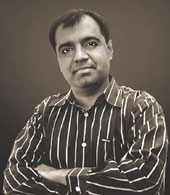 |
A middle-class boy from Delhi, Shantanu Prakash could not bring himself to opt for campus placements at the Indian Institute of Management, Ahmedabad (IIM-A), where he had just completed his programme in business administration. The year was 1988 and he was barely 23. “I deferred my placement hoping to strike out on my own. And I am grateful that I didn’t have to return to the institute looking for a job,” he says 17 years later.
Needless to say, he didn’t need to. For, over the years, Prakash has created a Rs 32-crore education technology company ? Educomp Solutions ? that sets up computer labs in schools, develops digital content for classes and offers teachers training programmes. It has also just branched out into the online tutorial business. “We are in the business of education that caters to the K12 (kindergarten to class 12) market today,” he says.
After stepping out of IIM-A, Prakash worked in a quasi-entrepreneurial education venture for a while but quit soon to launch Educomp. The company started out by setting up computer laboratories in schools. “Carmel Convent in Gwalior gave me my first break,” he recalls. The school continues to be an Educomp client though convincing the management then was an uphill task. “Computers were expensive and not widely used,” he says.
But Carmel Convent accepted Educomp’s proposal as Prakash said that his company would invest in the PCs. “I said let the students pay me a nominal sum per month for the services. The idea clicked,” he recalls.
A private school may have kickstarted Prakash’s business operations, but today a large chunk (almost 40 per cent) of his revenues comes from government schools. Educomp works closely with the central government and state governments to set up computer labs in schools run by them. While government schools are still focusing on providing basic computer literacy, private schools are now keen on including multimedia education, Prakash says. So less than two years ago, Educomp started developing multimedia content. Today a team of over 100 content developers in Delhi and Bangalore creates lessons and programmes that can be used in classrooms. To help teachers access the digital lessons and programmes, the company stations its assistants in schools that lease the content.
“What we create helps promote multi-sensory learning,” says Prakash. Delhi Public School branches in the capital (those in R.K. Puram and Vasant Vihar, for instance), and the Padma Sheshadri School in Chennai are some of its clients for digital content.
Prakash’s business idea has taken off for two reasons. One, schools are increasingly keen on including computer education in a big way. Two, his BOOT (Build-Own-Operate-Transfer) model is quite appealing. “We tell clients that we will network the school and set up the infrastructure at our cost, offer content and charge between Rs 80 and Rs 100 per student a month. Three years later, we transfer the assets to the school,” he says.
In the past one-and-a-half years, 60 schools have accepted his proposal. Another 60 deals are in the pipeline. Prakash hates projecting revenues, but when pushed he admits that the company's turnover will jump to Rs 50 crore at the close of the current financial year.
But content will not be the only growth driver, he clarifies. The spurt in business will also come from the online tutorial business. Six months ago, Educomp launched its tutorial service in mathematics for the US market. The service was advertised online and 600 students have already enrolled and are taking lessons in maths (for $20 an hour) from teachers in India. Clearly, Educomp is setting its eyes on the $ 8 billion private tutorial industry.
Prakash says the education process outsourcing industry offers a huge opportunity globally. “It is a great business as India has a pool of talented teachers most of whom are poorly paid.” His next initiative is to start English language tuitions for students in Korea.
But why did Shantanu Prakash think of getting into the business of education? Because its intellectual property component was higher than the capital component requirement. “With my service-class background, I could not have set up a capital-intensive business,” he says. “Besides, education will never go out of fashion,” he feels. To underscore the point, he quotes government data: there are 960,000 government-run schools in India. But it will need another 350,000 in three years. And Prakash wants to make sure that Educomp will be there in many of them.
As told to Suchi Bansal in New Delhi










